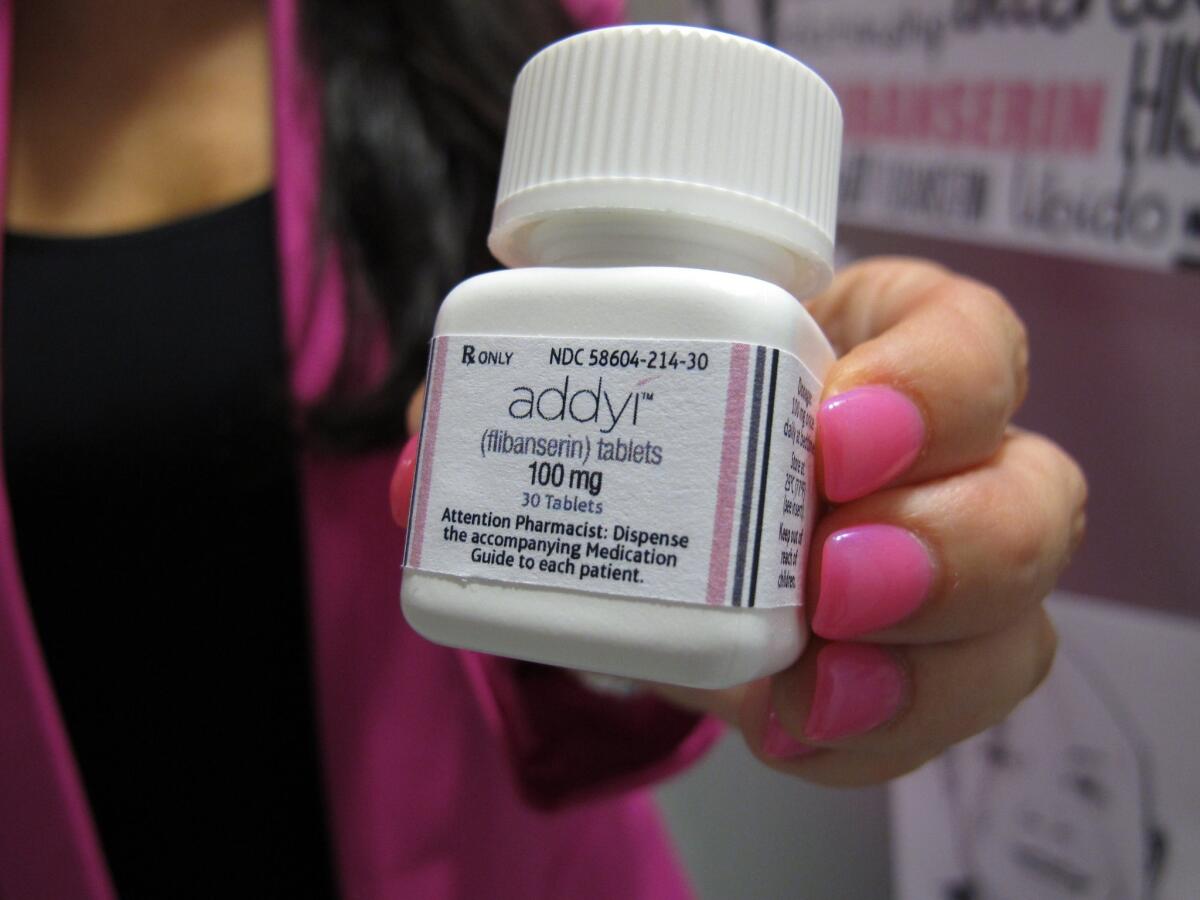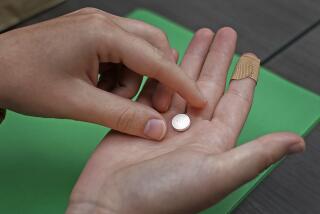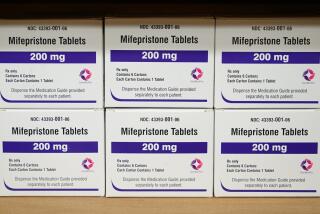FDA approves new sex drive drug, giving women more options for boosting their libidos

The Food and Drug Administration on Friday approved a new medication for premenopausal women whose flagging libidos are a source of personal distress or relationship difficulties.
The injectable drug bremelanotide, to be marketed as Vyleesi, will become just the second FDA-approved treatment for “female hypoactive sexual desire disorder,” or HSDD. The condition, which was first recognized in its gender-specific form in 2012, is thought to affect as many as 1 in 10 women before the onset of menopause, and many more after that.
“There are women who, for no known reason, have reduced sexual desire that causes marked distress, and who can benefit from safe and effective pharmacologic treatment,” said Dr. Hylton V. Joffe, who oversees urological and reproductive drugs in the FDA’s Office of Drug Evaluation. “Today’s approval provides women with another treatment option for this condition.”
Based on a compound first explored as a tanning product, Vyleesi activates melanocortin receptors, which modulate skin tone. The FDA said that the mechanism by which the drug improves sexual desire and related distress “is unknown.”
Though female HSSD drugs are routinely referred to as “pink Viagra,” Vyleesi takes a very different approach to producing its desired effect.
Instead of increasing blood flow to the sex organs, as Viagra and other erectile dysfunction drugs do, bremelanotide is thought to amp up a woman’s desire by changing the mix of neurochemicals involved in female sexual arousal — specifically the “feel good” chemical dopamine.
“The wellspring of female sexuality is the brain, and starting there makes sense,” said Dr. Nicole H. Cirino, a reproductive psychiatrist at Oregon Health & Science University.
READ MORE: Pink Viagra: Can’t get no satisfaction »
Vyleesi is designed to be injected under the skin of a woman’s abdomen or thigh at least 45 minutes before she anticipates sexual activity. The FDA said women may decide the optimal time to use Vyleesi based on how long they experience both benefits and side effects, which can include nausea and vomiting, flushing and headache.
Patients should not use more than one dose within 24 hours or more than eight doses per month, the FDA cautioned. And women who do not experience an improvement in sexual desire or associated distress should not use Vyleesi for more than eight weeks.
Even with Friday’s decision, the number of pharmaceutical options for women’s sexual health remains far short of the more than two dozen drugs approved for men.

In recent years, the FDA weathered charges that gender discrimination and official neglect have slowed its evaluation of drugs to treat women’s sexual dysfunction. With women growing more vocal in demanding the FDA lend equal weight to their needs, the agency underscored its intent to deliver.
“As part of the FDA’s commitment to protect and advance the health of women, we’ll continue to support the development of safe and effective treatments for female sexual dysfunction,” Joffe said.
Vyleesi was the first drug intended for women to be evaluated on measures that view women’s sexual function — and dysfunction — as sharply different from men’s.
The FDA held public forums and sought expert opinion on how best to judge the effectiveness of sexual dysfunction drugs for women. The measures that emerged from that process included the extent to which a drug might increase sexual desire and reduce a woman’s distress. Both were used in the evaluation of Vyleesi.
As the FDA discovered in 2015, when it approved a pill called Addyi (fibanserin) as the first drug for female HSDD, controversy and questions abound when female sexual desire becomes the object of measurement, medicalization and pharmaceutical modification.
Vyleesi’s sponsor, AMAG Pharmaceuticals of Waltham, Mass., hopes their product will put an end to those debates. Not only is their medication safer than the one on the market now, AMAG says, women’s sexual concerns are better understood and the FDA’s deliberations better reflect women’s needs.
The times have changed too. Thanks to the #MeToo movement, women are claiming more control over their bodies and their sexuality, said Dr. Julie Krop, the company’s executive vice president and chief medical officer. When that part of their lives falls short, they want to discuss it with their doctors and fix it, she said.
“It’s shocking that this has been such a buried topic, taken for granted and not really valued,” Krop said.
READ MORE: As FDA approves ‘pink Viagra’ for women, controversy persists »
Long before the FDA’s decision was scheduled, AMAG primed the public for Vyleesi’s approval, sponsoring a campaign it called unblush to spread the word about female hyposexual desire disorder.
Key to unblush’s message: that HSDD can be caused by an imbalance of certain hormones and neurotransmitters in the brain, a surmise drawn from functional MRI scans of women with varying levels of sexual desire. If the basis of the condition is physiological, the campaign suggests, so too may be the fix.
There’s no definitive scientific proof that low sexual desire in women is caused by aberrant brain chemistry, said Lori Brotto, a psychologist who directs the University of British Columbia’s sexual health laboratory. But she said there’s good evidence that the mind-body nexus is key to women’s sexuality, and that having a physiological explanation for a distressing condition does lead many people to seek help for a problem they might have otherwise dismissed.
By the measures the FDA uses to determine the effectiveness of HSDD drugs, Vyleesi appears promising: In a final round of clinical trials, 60% of subjects taking it reported improvement in the distress levels they felt over their low libido — a significant increase over the roughly one-third of women taking placebo medication.
AMAG is counting on Vyleesi to gain more traction with women and doctors than has Addyi, a medication that was shown in clinical trials to modestly increase women’s sexual desire and the number of “sexually satisfying events” they reported in a month.
Since its 2015 approval, Addyi’s commercial appeal has been limited not only by those modest claims of effectiveness, but by lingering safety concerns and cost as well. Women must take the medication daily, at a cost of as much as $426 a month. And while the FDA recently loosened warnings against any alcohol consumption by women taking Addyi, it has cautioned that the drug should not be used within two hours of alcohol consumption.
As an “on demand” drug — one designed to be taken only when women want to have sex — Vyleesi is likely to be less expensive than flibanserin, and to have fewer interactions with other drugs women take. AMAG has told the FDA that patients taking the drug “may experience a small, transient increase in blood pressure that returns to baseline.”
Dr. Sharon J. Parish, former president of the International Society for the Study of Women’s Sexual Health, has prescribed Addyi and found it effective for some of her patients. But the ways in which women’s sex lives can get off track are many, and women and their doctors need more options that work differently, she said.
“Bremelanotide’s availability will offer a new approach,” Parish said. “There’s a select group of patients for whom enhancing certain neurotransmitters is just what they need to kick-start a complex process. I think it’s a good time to be in the field of sexual medicine.”
Several more offerings for women experiencing sexual troubles are waiting in the wings. And in marketing materials, backers are not shy about suggesting these drugs have “blockbuster potential.”
It’s a “huge market with unmet medical need,” said Eric Claassen, chief business officer of the Dutch firm Emotional Brain, which expects to bring a pair of female HSDD drugs to the FDA by 2023. Potential sales for his firm’s “personalized medicine” drugs, Lybrido and Lybridos, could peak at $2 billion, he said. Both are still in clinical trials and expected to be approved for marketing in Europe first.







